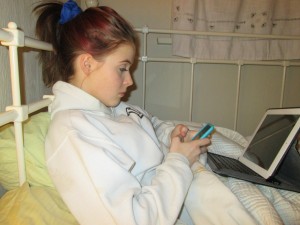Parenting In A Digital World
” It is the personal paradox of our time: never before has there been so much opportunity for families to plug in and at the same time disconnect.” Catherine Steiner-Adair, EdD
As parent’s you will be confronted with digital products available to stimulate the development of your children from the womb to adulthood. Our children now have immediate access to the commercial culture through computers and cell phones. The availability and use of digital technology has grown exponentially in the past ten years, so much so that we’ve  been inundated without even realizing what hit us.
been inundated without even realizing what hit us.
It is much more difficult for parents to establish a family culture that isn’t imposed upon by a violent and hyper sexualized commercial/pop culture, causing many to feel as if they are losing a hold on their kids and their family centre. As one parent expressed in the book, The Big Disconnect, “I have this feeling we’re all just camped out in the house on these different screens, and I feel like there’s been this deterioration of connection and I don’t know how”.
On the other hand, you may feel there are great benefits to this new age of digital technology. For those of you living far away from family there is nothing like Skype to keep in touch. The internet allows us to be more connected, access knowledge and to promote social change. Raffi Cavoukian, in his new book about the digital world, refers to beneficial aspects of the web as the Light Web. The concern is that we haven’t fully realized or acknowledged the harmful aspects, described by him as the Dark Web.
It is imperative that we as parent’s become digitally literate in order to monitor and teach our children to make healthy choices about social media use. Begin early to set clear parameters regarding how long your child is allowed to be on screen, which includes TV, internet, cell phone use, video games etc. Involve them in setting up a reasonable schedule of screen time. Say goodnight to cell phones and all other electronics.
Experts say that children should not even be on screen until at least age two. Children need to spend the early years having real experiences in the real world to develop socially, emotionally, physically and cognitively. A young child on screen playing a dress up game, for example, will simply not use the imaginative mind and the senses in the same way he/she will if playing with real clothes, and real friends. Ultimately, you as a parent can decide based on being tuned in to how your child is behaving. Are they tired, grumpy and have that glazed over look? Are they less and less socially interactive? Perhaps too much screen time.
Teach your children how to critically think about computer and cell phone use. Children often do not realize that what they put online stays online. They feel anonymous behind the screen and don’t understand the expanse of the internet. Help them to understand by asking questions such as: Would you feel comfortable if your classmates and your teacher saw this picture or post?
Get to know which sites your children are using. Find out about them by talking to your children and talking to other parents. When I first heard about Snapchat, one of my children told me it was harmless because the pictures only stay on for a few seconds before they disappear forever. With further research I discovered that in fact, someone who is computer savvy would be able to resurface those ‘disappeared forever’ pictures and re-post them. I also discovered that many of the Snapchat pictures are easily ‘screen shot’ and re-posted, an easy means for kids to tease and bully someone.
Inform your children about cyber bullying at a young age. If digital literacy has been an ongoing conversation in your home your children will be more likely to talk about their concerns and questions related to use of various programs, less likely to make themselves vulnerable to bullying and less likely to take part in bullying on-line.
Most importantly, it’s up to us as parent’s to model healthy use of social media and technology. If we don’t want our children to be a part of the growing numbers of children who are addicted to the digital world we must show them another world. They need to see us having boundaries and taking time away from our cell phones, the internet, etc. Our children need not to have to constantly compete with us being in front of a screen. As said by a seven year old child in the book, The Big Disconnect, “My parents are always on their computers and cell phones. It’s very, very frustrating and I get lonely inside.” Help your children to engage in other activities by engaging with them in other activities while at home.
No digital learning program, entertainment or online relationship can compete with the real thing; strong, healthy, relationships our children have with us in real time are, and always will be, the best way for our children to grow and develop in a healthy way.
The following resources were used to research this blog:
Light Web, Dark Web; Three Reasons to Reform Social Media Before it Reforms Us by Raffi Cavoukian
The Big Disconnect – Protecting Childhood and Family Relationships in the Digital Age by Catherine Steiner-Adair, EdD.
So Sexy So Soon – The New Sexualized Childhood and What parents Can Do To Protect Their Kids by Diane E. Levin, Ph.D. and Jen Killbourne, EdD.
http://digitaltattoo.ubc.ca/protect/prevent-cyberbullying/


